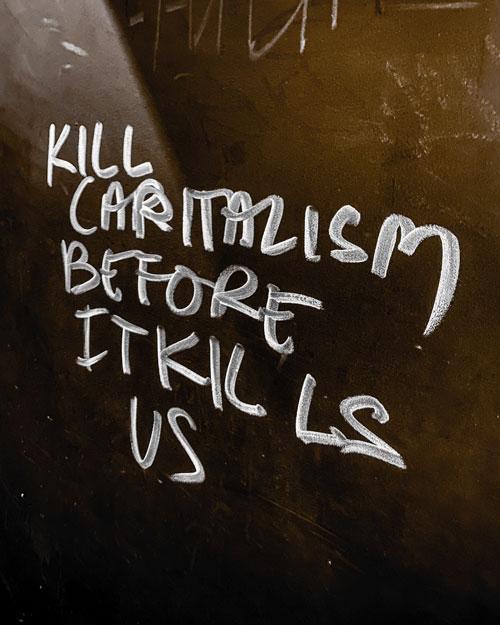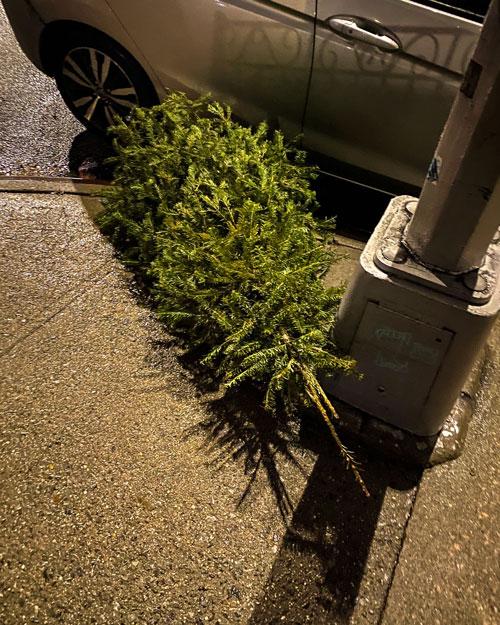Here at The Intercept, we are committed to ruining the holidays.
HERE AT THE INTERCEPT, our internal motto is “More Bad News for You, the Bad News Consumer.” We also sometimes refer to ourselves as “Your Daily Death March of Sorrow.”
That’s why, as you celebrate the holidays with your family, snuggling your loved ones close and putting out the cookies for Santa Claus, it’s on brand for us to remind you that capitalism is killing us all.
So let’s get going. (If you’re not ready to dive in immediately, you can limber up by reading our previous yuletide bummer, “Merry Christmas! Remember the Children Who Live in Fear of Our Killer Drones.”)
Ho Ho Ho for Capitalism.
Instead of the good news of Jesus, let’s start with the good news of capitalism. Even Karl Marx and Friedrich Engels, not known as capitalism’s biggest fans, acknowledged it in “The Communist Manifesto” in 1848:
The bourgeoisie … has been the first to show what man’s activity can bring about. It has accomplished wonders far surpassing Egyptian pyramids, Roman aqueducts, and Gothic cathedrals.
The bourgeoisie, during its rule of scarce 100 years, has created more massive and more colossal productive forces than have all preceding generations together. What earlier century had even a presentiment that such productive forces slumbered in the lap of social labor?
The writer William Greider takes the same perspective in “Secrets of the Temple,” his gigantic tome about the Federal Reserve. Capitalism, he contends, was “a Faustian bargain. People surrendered control over their own lives and accepted a smaller role for themselves as cogs in the vast and complicated economic machinery, in exchange for mere material goods.” Nevertheless, you have to admit that “the devil certainly kept his half of the bargain.”
Take a look around where you’re sitting now and consider the huge quantities of crap just in your eyesight that you’ve accumulated, all thanks to capitalism. One of us (Jon) can see his iPad, which helps him understand the amount of grease his thumbs apparently exude. There’s his smoke detector, which is beeping in a vain plea to get him to replace its battery. And there’s the huge bag of chipotle powder that he bought in a burst of misguided enthusiasm in 2018, still four-fifths full. The other one of us (Elise) is sitting in fast-fashion polyurethane pants, made in Vietnam, that are already ruined and will eventually end up in the Great Pacific Trash Vortex. She’ll be spending her Christmas alone, traveling Italy, contributing to the tourist economy of a deeply neofascist government which hates journalists by buying large amounts of burrata, Aperol spritz, and whatever readily available substances she finds from the global market to numb the pain of living in such a society.
OK, those are the good parts of capitalism. Now let’s move on to the ones that risk the obliteration of Homo sapiens.
Covid-19 and Its Sequels.
Our response to Covid-19 should make us dubious about our chances if we go up against something even deadlier. Only 5.5 billion people have gotten even one dose of a Covid-19 vaccine, leaving billions more to host a constantly proliferating assortment of mutations. Already vaccines and therapeutics are less effective against new variants.
With some bad rolls of the dice, we could be back to the world of March 2020, or worse. This scenario is increasingly likely considering climate change and globalization. Another accurate point in “The Communist Manifesto” is that “the need of a constantly expanding market for its products chases the bourgeoisie over the entire surface of the globe. It must nestle everywhere, settle everywhere, establish connections everywhere.”
Sure, we could have decided to vaccinate everyone. Last year, the Organization for Economic Cooperation and Development estimated this would cost $50 billion, or 0.05 percent of the world’s annual gross domestic product. But we didn’t do it for very good reason: This would have hurt the “intellectual” “property” — and hence the profits — of Moderna and Pfizer.
So the downside here is our unending Covid nightmare. The upside is we now have 10 vaccine billionaires! We’d like to believe they’re spending this Christmas Eve together, downing negroni sbagliatos somewhere on the Amalfi coast, toasting the freedom that is capitalism. (If you violate their vaccine patents, the government will crush you like a bug.)

A DALL-E AI generation of “rich people drinking Aperol spritz on Amalfi coast during Christmas.” Image: Elise Swain/Getty Images; OpenAI
Death Is Profitable.
Capitalism also means the proliferation of weapons with no purpose — not that they ever, really, have a purpose. One key reason the U.S. advocated the expansion of NATO was that it would open up new markets for American arms dealers. A little-known but significant figure named Bruce Jackson cofounded an NGO called the Committee to Expand NATO in 1996 — all the while serving as vice president for strategy and planning at Lockheed Martin. He was also co-chair of the finance committee for Bob Dole’s 1996 presidential campaign. Jackson was still at Lockheed in 2002, the year he became chairman of the Committee for the Liberation of Iraq.
This had led to many merry Christmases, indeed. With dividends reinvested, Lockheed’s stock is up over 1,600 percent since the liberation of Iraq commenced on March 19, 2003, It’s up 25 percent just since Russia’s attack on Ukraine last February. Jackson currently owns a chateau and vineyardin the Bordeaux region of France.
Moreover, it’s a fervently held belief at the top of American society that they are doing good by doing well. George W. Bush once told Argentina’s president that “all of the economic growth of the United States has been encouraged by wars.” Way to say the quiet part out loud, again and again.
And it’s not just conventional arms that are profitable. Building nuclear weapons systems is also quite lucrative. With these kinds of financial incentives in place, it’s incredible that human civilization still exists.
But of course, we could go at any moment. The U.S. military is likely to secure $858 billion for its budget next year. At $150,000 apiece, this is enough to fire 57 million Hellfire missiles at Santa’s sleigh as he speeds in terror across the winter sky.
Global Warming, Plus Bigger Problems.
This is the one problem of capitalism where we’d really like to beg the Gods — Christian/Jewish/Muslim, Hindu, Norse, Mesopotamian, miscellaneous — for a Christmas miracle. The Earth, as we know it, is fucked. We’re currently at 417 parts per million of carbon dioxide in the atmosphere, up from 280 ppm pre-capitalism. And that’s still not enough to satiate the shrieking, sucking mouth of the market.
Russia sees the melting Arctic and has decided this is a wonderful opportunity to extract the region’s hitherto inaccessible oil. Burning this will melt the Arctic further, making more oil available, in a virtuous circle of suicide. While making false promises in the fight against the climate crisis, America took the lead in crude oil production last year. Right behind us are the world’s other oil producers, from the despots of Saudi Arabia to the bland democracy of Canada. It’s like a “Murder on the Orient Express”-style mystery, where humanity is killed by every passenger.
It’s getting pretty close to night-night time for ocean life, most of the insects on Earth, half of the birds, too. Oh, and a third of the trees. When this will take out people is hard to predict, just as you never know which piece you have to remove to cause everything to collapse in a game of Jenga.
If you find this distressing, consider the more distressing fact that even if we develop massive amounts of green energy and stop global warming, capitalism will still probably destroy a livable biosphere.


–Scenes in the days before Christmas Day in Brooklyn, N.Y. on Dec. 22, 2022. Photos: Philipp Hubert/The Intercept
The Terrifying Politics of Wanting, Wanting, Wanting.
You probably don’t fantasize about how to decorate your mansion on Mars. This is because owning a Mars mansion has never seemed like a possibility in your life. But what if you were constantly bombarded with ads showing Matthew McConaughey in his luxurious nine-bedroom Mars home, living it up with all the Powerball winners who also live on the fourth planet from the sun?
While we Americans have spent our entire lives marinating in advertising tempting us with luscious products to consume, the truth is that humans do not have strong inherent desires for material goods. Let’s imagine humans in a world devoid of induced craving: We would probably work enough to have food to eat, live off the land, and spend the rest of the time futzing around (aka leisure).
Capitalism has truly perfected the creation of wants.
How, then, could capitalists get people to work hard at extremely unpleasant jobs? For a long time, the answer was simple: slavery. But then, in the 19th century, slavery was driven to extinction in the Western hemisphere. During this time, there was surprisingly frank planning among capitalists about this aspect of human nature. Given this problem, how could they motivate people to do the same awful work enriching others without the threat of force? They decided one important tactic should be to “create wants.”
As a member of the British Parliament put it in 1833:
They [people formerly enslaved by the British Empire] must be gradually taught to desire those objects which could be attained by human labour. There was a regular progress from the possession of necessaries to the desire of luxuries; and what once were luxuries, gradually came, among all classes and conditions of men, to be necessaries. … This was the sort of education to which they ought to be subject.
A United Fruit staffer made the same point in the 1920s about Central Americans:
The “mozos” or working people have laboured only when forced to and that was not often, for the land would give them what little they needed. … The desire for goods, it may be remarked, is something that has to be cultivated. … Our advertising is slowly having the same effect as in the United States … All of this is having its effect in awakening desires.
By now capitalism has truly perfected the creation of wants. They’re as much a part of those of us in rich countries as our arms or legs. We will resist anyone telling us we should give up these wants, as much as we’d resist someone trying to cut off our limbs.
This is surely a part of the recent rightward lurch in politics in the U.S. and elsewhere. Progressive politics necessarily makes the case that there’s more to life than the money in your individual bank account. It’s inevitable that many people will experience this as psychological violence and respond in kind, or with real violence.
Stay tuned to find out how this dynamic will interact with all the capitalistic crises heading our way.
Now Dasher, Now Prancer, Now Insoluble Dilemma.
Traditionally this is the part of the article where we describe the uplifting solution to the aforementioned problem. Here’s what we’ve got for you:
…
…
[faint sound of coughing]
…
The literary critic Fredric Jameson has famously said, “It is easier to imagine the end of the world than to imagine the end of capitalism.” Capitalism isn’t just outside of us, it’s inside too. It’s grown in us like an aggressive tumor, twining around our organs until it’s hard to know where it stops and we begin. It’s killing us, but cutting it out might kill us too.
So, uh, Merry Christmas. No need to thank us for this atrocious conclusion. Here at The Intercept, we don’t need thanks for getting up every day and doing our job. But that Jameson quote reminds us that a big bottle of Jameson whiskey can be ordered online for $56.92 (if you’ve got the money).
First published on The Intercept.
Shared via –

This work is licensed under a Creative Commons Attribution-NonCommercial-NoDerivatives 4.0 International License

